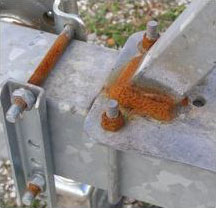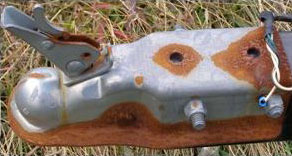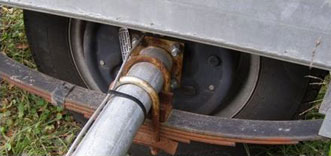| Most frequently asked questions about PMI Trailers | |||
| We sell our PMI pontoon trailers through a network of quality marine dealers. There is no way for customers to leave positive reviews for our trailers, although they often do so on the boat dealers website. We handle our own warranty, and we get questions and an occasional problem. Many of the questions seem to take the form of “frequently asked questions” so we’re listing some here. | |||
| I bought my rig from a marine dealer near Detroit. I’ve towed boats before but when I saw that 25’ Bennington on your 30’ trailer, it was bigger than anything I’ve ever towed. I have a GMC Yukon, it was six hours home to the Finger Lakes but everything was fine. When we got home I noticed the little aluminum cover on the front right wheel was missing. Can I fix this? | |||
|
|||
 Sorry for the problem, your trailer must be a couple years old. This had been a difficulty that we resolved in January of 2019. We’ve sold pontoon trailers with 1200 pound front loading winches for years, but we started having failures. It finally hit us that pontoons don’t weigh 1500 pounds anymore. Modern pontoons need a stronger winch. We’re sending our 3200 pound Heavy Duty winch as a replacement, it’s been standard on our trailers since January 2019 and shouldn’t fail with your big pontoon. We use them now on all of our trailers. |
|||
| My wife followed me and noticed that the center light bar on our trailer didn’t work when I applied the brakes. I checked the wiring it looks good. What could it be ? | |||
 |
|||
| The center light
bar is a “running” light. It only comes on when you use the lights on your tow
vehicle. Check by turning your headlights on, I’ll bet it works. |
|||
| We have a two year old Mid America trailer. It’s full of rust. The manufacturer says it’s out of warranty, They say they bought it from you. I don’t believe a two year old trailer should rust this bad. | |||
 |
|||
|
I am truly sorry about this problem and although the manufacturers warranty is
only one year, and they refused to help you, we’ll replace the trailer. We no
longer sell Mid America and although we handled them for years, in the past few
years the finish deteriorated. We’ve had difficulties that have cost us a lot of
money, but we know warranty when we see it. We’ve changed manufacturers, the
trailers we sell today have the modern
Rock Guard, textured
powder coat finish. Your new trailer will have this coating. |
|||
| Attached are pictures of rust on our trailer. Serial number attached. Is this warranty? | |||
 |
|||
| We checked the serial number of your trailer, this is the fourth season you’ve owned it. We have a pretty liberal warranty policy, but after a couple years, maintenance is the customers responsibility. Your trailer didn’t just rust this fourth year, it probably started in the second or third year. The rust is around the bunk bracket where the bracket chaffs the frame, yet the trailer frame seems good. We see scraped fenders all the time, when you scratch the paint, on any kind of steel trailer, the steel will rust. If you check your trailer once a year, when the boat is in the water, and touch up any small scrapes or rust spots the trailer will look good for years. Our new Rock Guard Textured Powder Coat probably wouldn’t rust in four years, but scrapes or scratches not touched up will rust on any trailer. | |||
 Any painted, even Rock Guard textured powder coat will deteriorate in salt water. Every couple of years we’ll see a painted trailer that’s been to salt water. The customer says they rinsed it every time they launched, but the finish is destroyed. No trailer manufacturer will warranty their finish in salt water. Trailer going into salt water must be hot dipped galvanized. Some of the galvanized trailers sold in the north are not hot dipped. and many will rust in salt water. |
|||
|
|
|||
| I noticed the wood beneath the carpet on my bunks isn’t treated. Shouldn’t it be? | |||
| About eight years the EPA made changes in the way wood was treated. The old method was CCA treatment. Arsenic was the active ingredient used to retard rot. The new treatment is ACQ, the active ingredient is copper sulfate. Copper sulfate can leech through carpet and stain aluminum pontoons. To our knowledge, all trailer builders are using raw untreated wood. | |||
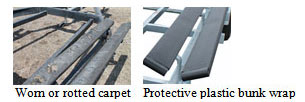 Should I treat the wood? You could, but we’ve used untreated wood for about eight years. We haven’t heard of many customers replacing the wood. As the trailer ages, carpet will be torn or rotted before the wood. It’s just as easy to replace the wood with the carpet. Optional plastic bunk wrap will help prevent carpet from deteriorating |
|||
| My pontoon seems to “buck” when I travel. It’s rubbing the carpet on the winch stand arms. | |||
| Normally “bucking” is a sign of a weak frame, but our trailers have strong frames. If the front of your boat is wearing the carpet on the bow stops, it’s a indication that you aren’t using the anti-bucking loop at the base of the winch stand. After you get the boat on the trailer, unhook the winch strap from the boat tow eye, run it down through the loop and back to the boat tow eye. This helps holds the boat on the trailer but also pulls the front down to prevent bucking. It’s also a good idea, especially on a heavier boats to ratchet strap the back of the boat to the trailer. | |||
 |
|||
 Most newer boats have a bow toe eye on the front or second cross member. If your boat doesn’t have one, it’s an easy addition. Buy a threaded U bolt and drill a couple of holes in the cross member. |
|||
|
|
|||
| We’ve had our trailer several years and never needed load guides, but the dam broke and our lake is gone. We will be traveling, do you recommend load guides? | |||
 If we didn’t have competition we’d probably make load guides standard. But $100+ might cost a sale, so we make them optional. Even though you haven’t needed them in the past there’s usually a time they are helpful. If you boat on a river with a current or if you are retrieving your boat from a lake on a windy day you’ll appreciate load guides. Also if you are a frequent traveler towing to different lakes, you might want them. Our load guides consist of a set of 4. Generally 2 mounted in the back that help nudge the boat onto the carpeted bunks and 2 near the center keep the boat on straight. |
|||
|
|
|||
| One of your competitors sell electric brakes, a couple hundred dollars less than yours. Our dealer says electric brakes on boat trailers are bad, but he didn’t explain why. WHY ? | |||
 Electric
brakes are fine for cargo trailers, recreational vehicles, etc. They’re less
expensive because there is no “actuator” on the tongue of the trailer,
everything is electric. Although sometimes you need a brake controller in the
tow vehicle. Electric brakes are easier to install for the trailer manufacturer.
The reason quality boat trailer manufacturers don’t use electric brakes is that
the solenoid that engages the brakes is on the hub of the axle. The
hub of the trailer is submerged in water every time you launch and retrieve your
boat. Wires, electricity, and water are a bad combination. We’ve
sold special order trailers with electric brakes. One customers had the
controller already installed in their truck, but our system wasn’t compatible,
but we had no way of knowing it. Another had problems from day one and was
unhappy. No more special orders for customers who want electric brakes. Electric
brakes are fine for cargo trailers, recreational vehicles, etc. They’re less
expensive because there is no “actuator” on the tongue of the trailer,
everything is electric. Although sometimes you need a brake controller in the
tow vehicle. Electric brakes are easier to install for the trailer manufacturer.
The reason quality boat trailer manufacturers don’t use electric brakes is that
the solenoid that engages the brakes is on the hub of the axle. The
hub of the trailer is submerged in water every time you launch and retrieve your
boat. Wires, electricity, and water are a bad combination. We’ve
sold special order trailers with electric brakes. One customers had the
controller already installed in their truck, but our system wasn’t compatible,
but we had no way of knowing it. Another had problems from day one and was
unhappy. No more special orders for customers who want electric brakes.We want happy customers. |
|||
| How do hydraulic-surge brakes work? | |||
There is an actuator on the tongue of the trailer. When it senses the tow
vehicle slowing, a plunger (piston) is compressed and sends brake fluid to the
brakes. It’s entirely mechanical, no electricity. |
|||
| We’re questioning the extra cost of disc brakes for our situation, we don’t travel much. | |||
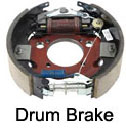  We
say there are only two reasons that you’d want disc brakes. If you
don’t travel much you’ll want them and if you travel a
lot you’ll want them. Old fashioned drum brakes require service.
The little springs and moving parts will freeze up if not used often, but no one
ever services drum style trailer brakes. The benefits of disc brakes are well
known, faster stopping, cooler, less moving parts, etc. The automotive industry
hasn’t used drum brakes for thirty years. Modern pontoons are heavier and more
people are traveling, we think it’s unethical that dealers aren’t all selling
trailers with modern disc brakes. Everyone recognized the benefits of disc
brakes but some sellers just don’t care what they sell you. The internet is full
of information about the benefits of disc versus drum brakes and there are even
kits to change drum to disc. We
say there are only two reasons that you’d want disc brakes. If you
don’t travel much you’ll want them and if you travel a
lot you’ll want them. Old fashioned drum brakes require service.
The little springs and moving parts will freeze up if not used often, but no one
ever services drum style trailer brakes. The benefits of disc brakes are well
known, faster stopping, cooler, less moving parts, etc. The automotive industry
hasn’t used drum brakes for thirty years. Modern pontoons are heavier and more
people are traveling, we think it’s unethical that dealers aren’t all selling
trailers with modern disc brakes. Everyone recognized the benefits of disc
brakes but some sellers just don’t care what they sell you. The internet is full
of information about the benefits of disc versus drum brakes and there are even
kits to change drum to disc. |
|||
|
|
|||
| My dealer seems to insist that we buy tandem axle brakes for our tandem axle trailer. WHY? | |||
I suspect that you’re in Michigan. It’s Michigan law that trailers with tandem
axle, or for that matter triple axles have brakes on each axle. In the past some
dealers have disregarded the law to save their customer's money. It’s a
liability issue. If you’re buying a boat-trailer package from a reputable
dealer, they don’t want to break the law. In addition more customers are getting
educated about braking capacity. Our single axle disc brakes will stop 3500 lbs.
Some of competitions little 7” brakes will only stop 2000 lbs. People get
confused because their boat weighs 3200 lbs., they assume they have 300 lbs.
extra stopping capacity. The weight of the trailer has to be figured in the
equation. Most tandem axle trailers for 22’-24’ pontoons weigh about 1000+ lbs.
A 3200 lb. boat on a 1000 lb. trailer weighs 4200+ lbs. |
|||
|
|
|||
|
|||
|
|
|||
| What should the hitch height be? | |||
|
The best height is 18” from the ground to the top of the ball. (16” to 19” will
work) The correct height is especially important for tandem axle trailers. |
|||
|
|
|||
| Do I need a spare tire? | |||
|
If you are buying a tandem axle trailer, 4 tires on the ground, you may or may
not need a spare. If your buying a single axle trailer, a spare is money well
spent. Finding a spare tire mounted on a rim on a Saturday or Sunday can be a
real nightmare. We encourage our customers to purchase spare tires and price
them as low as possible. When you buy a spare from us with the trailer, we
include a mounting U bolt at no charge. You must be careful in comparing tire
prices and sizes. There can be a $15-$20 difference between a B, C or D range
tire. Inferior tires with limited capacity will deteriorate quickly under load. |
|||
| How do the brakes work? | |||
|
Our standard brakes use a hydraulic “surge” system. There is a plunger in the
tongue of the trailer that is compressed when the tow vehicle slows. Brake fluid
is sent to the brakes. Surge brakes are the type used on 95% of boat trailer
brakes. Electric brakes are available (no decrease in price), but they require
special wiring in the tow vehicle and are not as popular on boat trailers as
cargo or other trailers because of the use around water. |
|||
| Will the trailer be “ready to go” when I pick it up? | |||
It depends on the information you supply us. As a policy we like to have
trailers fully adjusted to fit your pontoon boat when you pick them up. If you
order options like a spare tire or load guides, we will install them on the
pontoon trailer. During the order process we will ask the length of your pontoon
and the length of the deck, as well as the center to center dimension of the
pontoon tubes. If your information is accurate all you’ll have to do is float your pontoon boat onto the trailer. If it’s incorrect, you’ll need a 9/16” wrench and a few minutes labor. Our trailers are fully adjustable to fit all boats. |
|||
| I have a triple tube pontoon, do I need to support the center bunk? | |||
|
The main consideration is how the engine attaches to the pontoon boat
undercarriage. If the engine is "in" the center tube then the center tube
definitely should be supported. If, the center tube is separate from the engine,
with the engine mounted on a transom like an ordinary pontoon, then the center
tube may not need to be supported. In this situation, the only thing the center
bunk would support is the weight of the center tube which is usually only a
couple hundred pounds. |
|||
| Is this your best price and are there any other charges? | |||
|
The price published on the internet is our rock bottom best price. We get calls
from people who like to negotiate, but our policy is to give everyone the best
price from the start. Our best customers are those who have done some shopping
prior to coming to us, they recognize value. There are no hidden charges, no
freight, no make ready, no chicanery, the published price is the price you pay.
Our policy applies to options, if you buy a spare tire or load guides, that's
the price and we'll mount them on your pontoon trailer at no charge. Indiana
residents must pay sales tax. |
|||
| Do you deliver? | |||
|
The low internet price is for "pick up only" in Elkhart, IN. (North-central
Indiana). There may be occasions where we can contract with individuals to tow
single trailers, but too much freight will quickly ruin our good price. |
|||
| What is the warranty? | |||
|
Our trailers are covered, hitch to tail lights with a full one year limited
warranty. Tires are prorated by the tire manufacturer for wear and may in some
cases be good for more than a year. See our
Warranty Page |
|||
| What color is the trailer? | |||
|
Our pontoon trailers are black and the carpeted bunks are black. The reason they
are black is that black is a soft color and touches up easily with ordinary
black spray paint. |
|||
| How is the pontoon boat trailer painted and will it rust? | |||
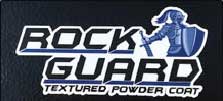 Our
pontoon trailers have a "powder cote" finish. This is the modern (and expensive)
method of coating steel, it requires a major expenditure in setting up a powder
cote system and many small manufacturers still "spray paint" their pontoon boat
trailers. Black powder cote electro statically adheres to the steel and is then
baked on. All painted trailers, no matter how carefully prepared will rust.
Going down a gravel road at high speed will cause stone chips in the pontoon
trailer frame. Deep scratches down to the bare metal will rust. Salt water will
destroy any paint finish in a matter of months. Keeping a pontoon trailer
looking good simply takes touching up signs of rust once a year with an
inexpensive paint.
Click here to Learn about Our
pontoon trailers have a "powder cote" finish. This is the modern (and expensive)
method of coating steel, it requires a major expenditure in setting up a powder
cote system and many small manufacturers still "spray paint" their pontoon boat
trailers. Black powder cote electro statically adheres to the steel and is then
baked on. All painted trailers, no matter how carefully prepared will rust.
Going down a gravel road at high speed will cause stone chips in the pontoon
trailer frame. Deep scratches down to the bare metal will rust. Salt water will
destroy any paint finish in a matter of months. Keeping a pontoon trailer
looking good simply takes touching up signs of rust once a year with an
inexpensive paint.
Click here to Learn aboutRock Guard. Any trailer, even a Rock Guard powder coated will rust in salt water. NO MANUFACTURER WILL WARRANTY THEIR PAINTED TRAILER FOR SALT WATER. |
|||
| Are your pontoon trailers galvanized? | |||
Galvanizing is a process that seals steel against oxidation and it is the best
defense against the corrosive effects of salt water. If you boat in salt water
your pontoon trailer must be galvanized. Salt water
will quickly deteriorate, (structurally as well as cosmetically) a painted
pontoon trailer. There is a trend among smaller pontoon trailer manufacturers
who have not invested in the expensive powder cote system to promote galvanized
frames. Salt water boaters must be especially cautious of these trailers. They
are not promoted as salt water "ready", the claim is simply that they are
galvanized. The problem is that these trailers are designed for fresh water and
usually the only thing that is galvanized is the frame. The hardware, axles,
springs, sometimes even the tire rims aren't galvanized and will deteriorate in
salt water. If you are a salt water boater our recommendation is to buy a local
brand of pontoon trailer built close to salt water, from a manufacturer who
understands salt water. Hopefully they will use the proper components to keep
your pontoon trailer operating trouble free in salt water. If you are a fresh
water boater who prefers to have a drab gray trailer, galvanizing may be for
you. YES, we offer galvanized trailers and if you are a snow
bird visiting salt water our galvanized trailers with galvanized wheels and
special hardware will do just fine, phone for availability.
|
|||
|
|
|||
| Which is better, the bunk pontoon trailer or the center-lift pontoon boat trailer? | |||
|
This is a question that has no standard answer; although we generally favor the
bunk style pontoon trailer for stability on the highway. There are however
applications where the center lift pontoon boat trailer may be beneficial. If
you launch and retrieve in shallow water; under 3’, the center-lift trailer can
sit your pontoon boat on the shore. If you’ve have a storage situation where you
want to put your pontoon in a garage with a low overhead door, you can lower the
frame and slide many pontoon boats under low doors. If you and a neighbors want
to go together and buy a single trailer to haul different boats, the center lift
pontoon boat trailer may make sense. Because of unique construction features our
Lo-Loader center-lift pontoon trailer is absolutely the safest and most stable
pontoon boat trailer of its kind. But, even with our unique design, your pontoon
boat is traveling on a 47” wide axle versus the 96” wide axle of the PMI
pontoon trailer. For most situations, a wider more stable pontoon trailer makes
more sense than a narrow axle pontoon trailer, no matter how safely the narrow
axle pontoon trailer is made. |
|||
|
I just pulled my new Premier Grand Majestic, RL-250 and think I have the
wrong size trailer. I’m SORRY, we checked with your dealer and under normal circumstances our PMI-24T Super Duty should be a perfect fit for the Premier RL-250. But, we dug deeper into the Premier boat models to discover that while most 250’s are 25’5” overall length, which the 24 SD would fit perfectly, the 250CL & DL models are 26’5” length overall. We can almost excuse the dealer, it’s the type of mistake that we could have made. Your dealer is a knowledgeable trailer dealer, but again a mistake was made. At this point in the season with winter storage upon us, the 1’ difference won’t make much of a difference, temporarily for winter storage. We’d suggest moving the winch stand a foot forward and store the boat. Next spring after you launch we’ll have a new 26’ trailer ready for you. |
|||
| PMI Owners, questions or problems just call (800)-877-1544 |

 The
little aluminum and rubber cover is the dust cap. It fits on the end of the
axle hub to keep the grease from splashing everywhere. Losing them is a
fairly common occurrence on a 96” wide axle. Axle come from the manufacturer
with grease but we run quality checks. We remove the cap and check for
grease. It’s possible we didn’t get it back on properly. Or, if it’s on the
right side you might have clipped a curb on the way home and knocked it off.
In either case it’s an easy fix. We’ll send a couple dust caps, check that
there is grease in the hub and tap the dust cap on with a mallet.
Make wide
turns.
The
little aluminum and rubber cover is the dust cap. It fits on the end of the
axle hub to keep the grease from splashing everywhere. Losing them is a
fairly common occurrence on a 96” wide axle. Axle come from the manufacturer
with grease but we run quality checks. We remove the cap and check for
grease. It’s possible we didn’t get it back on properly. Or, if it’s on the
right side you might have clipped a curb on the way home and knocked it off.
In either case it’s an easy fix. We’ll send a couple dust caps, check that
there is grease in the hub and tap the dust cap on with a mallet.
Make wide
turns. 
